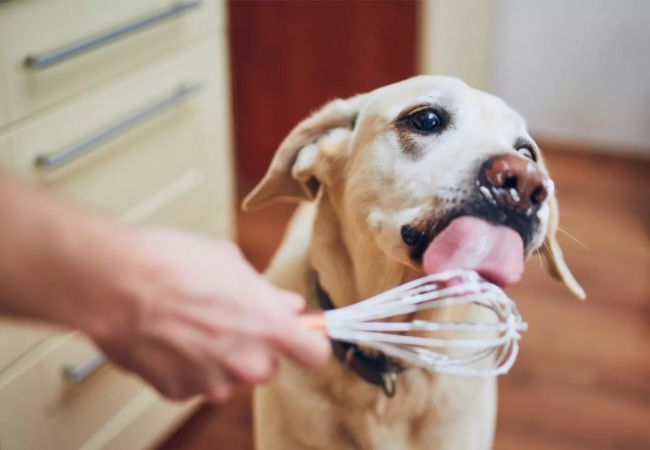Why Does My Dog Lick Everything? Vet Explains & What to Do 🐶✨

In this article
Why Does My Dog Lick Everything? Vet Explains & What to Do 🐶✨
By Dr. Duncan Houston BVSc
Your dog licks the floor, your hands, their paws, their bed—even the air. It can be cute… or concerning. But why do dogs lick so much? And when is it something you should worry about?
I’m Dr. Duncan Houston. In this article, I’ll explain the most common causes of excessive licking in dogs—and how to know when it’s normal, behavioral, or a sign of an underlying issue.
🔍 Common Reasons Dogs Lick Things
- 🧠 Behavioral – self-soothing, boredom, habit
- 🦷 Sensory – exploring tastes, smells, textures
- 🍗 Food residue – licking floors, furniture, or you for snacks
- 😰 Stress or anxiety – nervous dogs may lick compulsively
- 🦴 Pain or itchiness – localized licking of a sore joint or itchy skin
- 🩺 Medical – nausea, GI upset, dental issues, or cognitive decline
🧠 Behavioral Licking: When It’s Normal
- 🐶 Licking their paws briefly after walks
- 🤝 Licking your hands or face as an affection
- 🧸 Licking a blanket or bed to selfsoothe before sleeping
Vet Tip: If it’s occasional, brief, and easily redirected—it’s likely harmless.
⚠️ Signs It’s a Medical or Anxiety Issue
- 🔁 Repetitive, obsessive licking (e.g., same spot for 20+ minutes)
- 🧪 Licking at walls, air, or nonfood objects (e.g., carpets, furniture legs)
- 🤢 Lipsmacking or air licking = possible nausea
- 🐾 Licking one paw obsessively = pain, allergies, or infection
- 😓 Restless licking during storms, visitors, or when alone
🩺 Conditions Linked to Excessive Licking
- 🦠 Yeast or bacterial skin infections
- 🧬 Allergies (environmental or food)
- 🍽️ Acid reflux, nausea, or gastrointestinal upset
- 🧠 Canine cognitive dysfunction (especially in seniors)
- 🦷 Dental disease or oral pain
If your dog is licking constantly and it’s interfering with sleep, eating, or play—book a vet check.
🧘♂️ How to Reduce Excessive Licking (Behavioral)
1. Add Mental Stimulation
- 🧠 Puzzle toys, sniff games, or short training sessions
- 🧩 Rotate toys daily to avoid boredom
2. Use Lick Mats—on Purpose
- 🍯 Smear with peanut butter or wet food to give the “lick drive” a healthy outlet
- 🛏️ Offer at nap time or after walks to encourage calm
3. Rule Out Triggers
- 📉 Are they licking more during storms, when alone, or when bored?
- 🎯 Track licking episodes to find patterns
4. Prevent Reinforcement
- ✋ Don’t respond emotionally or reward the behavior unintentionally
- 📣 Redirect calmly with a toy or command (“leave it,” “on your bed”)
🚫 What Not to Do
- ❌ Don’t use bitter sprays or punishment
- ❌ Don’t ignore obsessive licking if it’s daily or intense
- ❌ Don’t assume it’s “just a quirk” without ruling out health issues
🎁 Products That Help
- Dual Pocket Treat Dispenser – Reward redirection and reinforce calm behavior
- Bungee Lead – Helps manage leash frustration that can trigger licking after walks
- Explorer Harness – Keeps pressure off sensitive necks for dogs prone to oral issues
💬 What Dog Parents Say
“Our dog licked the couch nonstop. Turned out it was stress. We switched to lick mats and enrichment toys—problem solved.” – Lucas & Olive
“She kept licking her paw for weeks. A vet visit showed early arthritis. I’m so glad we didn’t ignore it.” – Renee & Koda
👩⚕️ Not Sure Why Your Dog Is Licking Constantly?
Send your dog’s age, behavior pattern, and medical history to Ask A Vet and get a personalized evaluation and stepbystep plan from a veterinarian.
Final Thoughts
Licking is normal—until it’s not. Watch for changes in frequency, intensity, or context. Whether it’s boredom, stress, or a hidden health issue, you can help your dog by identifying the cause and providing a safe, supportive solution.






